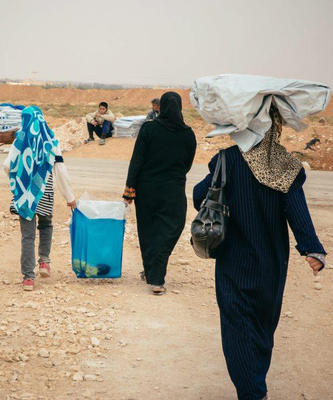Date:
Location:
The Advanced Training Program on Humanitarian Action (ATHA), Harvard Humanitarian Initiative, presents the live recording of its Humanitarian Assistance Podcast with

H.E. Dr. Reem Abu Hassan, Lawyer, human rights advocate and civil society activist; Jordanian Minister of Social Development, 2013-15
Dr. Amira Ahmed Mohamed,
Assistant Director of Policy & Practice, Boston Consortium for Arab Region Studies; Counter Trafficking Program Manager and Head of Capacity Building Unit, International Organization for Migration (IOM)
Kate Akkaya, JD, UNHCR US Protections Unit; Refugees Rights Turkey Legal Fellow; Program on Human Rights in the Global Economy Fellow, 2016
Dr. Denis Sullivan, Director, Boston Consortium for Arab Region Studies;
Professor of Political Science & International Affairs, Northeastern University
Since the beginning of the Syrian Civil War in 2011, the neighboring countries of Lebanon, Turkey, and Jordan have collectively absorbed approximately 5 million registered refugees--not counting the untold numbers who remain unregistered. As their displacement becomes increasingly protracted and the crisis shows no signs of abating, humanitarians have highlighted the increasing need to shift focus to social cohesion and rehabilitation efforts with an eye toward long-term development. This is especially true for the countries immediately surrounding Syria, where the vast majority of Syrian refugees reside. Due in part to the reticence of Western countries to play a larger role in resettling refugees and the financial and political incentives that have been offered for hosting them closer to home, communities in the Middle East are primarily responsible for addressing the continuing needs of this population.
As the crisis drags on, integration is impeded by numerous protection challenges in the official camps, informal tented settlements, and host communities where refugees have taken shelter. The rapid influx has strained existing infrastructure and protection apparatuses which are particularly necessary for women and children who make up more than half of all refugees. This is especially the case in the area of education, with some host countries moving to “double shift” school models in efforts to combat the low enrollment of large numbers of Syrian refugee children. As UNICEF Lebanon Representative Tanya Chapuisat notes, “Poverty, social exclusion, insecurity, and language barriers are preventing Syrian children from getting an education, leaving an entire generation disadvantaged, impoverished, and at risk of being pushed into early marriage and child labor.”
In addition to education, accessing the labor market also poses a significant challenge for refugees. For female refugees arriving alone certain legal and cultural frameworks can limit opportunities for employment and impede their ability to provide for their families. In Jordan and Lebanon, for example, women are not allowed to pass citizenship down to their children, leaving a new generation of undocumented, Syrian refugee children at even greater risk for exploitation. Limited employment opportunities for male heads of households have also disrupted traditional family roles, with additional research showing an increase in domestic and gender-based violence.
In a panel conversation with experts and practitioners, this podcast will explore how the Syrian refugee crisis is reshaping host communities in the Middle East, what challenges remain for the protection of vulnerable populations, and opportunities for advancing humanitarian protection and the integration of refugees into host communities.
Moderated by Meredith Blake, Host of the Humanitarian Assistance Podcast, Advanced Training Program on Humanitarian Action, Harvard Humanitarian Initiative.
For more information: http://www.atha.se/podcasts/resettling-syrian-refugees-intersection-rehabilitation-and-protection
Co-sponsor: Boston Consortium for Arab Region Studies, CMES
Contact: Liz Flanagan
Photo: @UNHCR/J.J. Kohler
